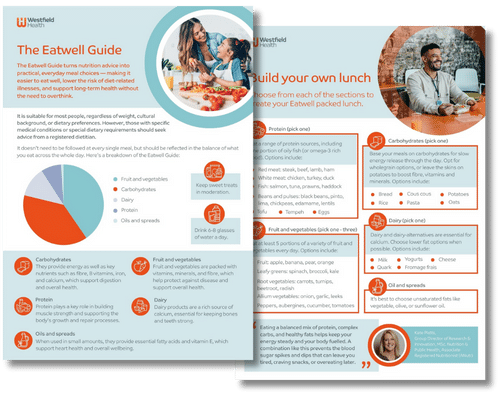Good nutrition is one of the most powerful tools we have to support our health and wellbeing. How we choose to fuel our bodies every day affects our mood and energy levels and plays a big role in preventing long-term health problems.
The Eatwell Guide can help you look at what your current meals, drinks and snacks are and find healthier options from each food group. Despite public health advice, only 17% of adults and 9% of teenagers meet the daily target for fruit and vegetable consumption. Simply being more aware of what you’re eating can make a real difference in managing your energy, blood sugar levels and overall health.
Fruit and vegetables: Eating five a day
Fruit and vegetables are at the heart of a healthy lifestyle. They should make up over a third of the food we eat each day. Packed with vitamins, minerals and fibre, they help protect against illness, support digestion, and keep us feeling energised.
One portion is equal to 80 grams, which can be:
- 1 apple, banana, pear, orange, or another fruit of a similar size
- 3 heaped tablespoons of vegetables
- 1 dessert bowl of salad
- 30g of dried fruit
- 150ml of fruit juice or a smoothie (counts as no more than one portion per day)
Small steps for getting your five-a-day can include snacking on fruit or keeping frozen vegetables in the freezer for meals.
Carbohydrates: main provider of energy
Carbohydrates are our main source of energy. These foods are versatile, filling, and should make up just over a third of our daily diet. They also provide fibre, iron, and B vitamins, which help support digestion and overall health.
To get the most benefit, choose wholegrain or higher-fibre options like wholemeal bread, brown rice, oats, or wholewheat pasta. These keep you fuller for longer but also help maintain steady energy levels throughout the day.
Small steps for healthier choices include choosing wholegrain cereal for breakfast, or brown rice with dinner, to boost your fibre intake without much effort.
Protein: growth and repair
Protein is vital for growth, repair, and strength. It helps us maintain healthy muscles and bones and keep our immune system strong. This group includes beans, pulses, fish, eggs, meat, nuts, and plant-based alternatives.
The Eatwell Guide recommends including a variety of protein sources in your diet, with two portions of fish a week. One of these should be oily, such as salmon or mackerel. Plant-based proteins like beans, lentils, and chickpeas are great budget-friendly and heart-healthy choices too.
Getting more protein into your diet can mean planning more meals or making small swaps such as opting for Greek yogurt or swapping a sandwich for an omelette.
Dairy and alternatives: bone and muscle health
Dairy foods include milk, cheese, plant-based alternatives or yoghurt. They are key sources of calcium, protein, and vitamins. These nutrients are especially important for strong bones and teeth.
The Eatwell Guide recommends choosing lower-fat and lower-sugar options where possible, such as semi-skimmed milk or plain yoghurt.
Fats and spreads: small amounts for essential fats
Although we do need fats in our diet, the type of fat matters. Healthier unsaturated oils, such as olive, rapeseed, or sunflower oil, are better for heart health than butter, lard, or palm oil.
One thing to bear in mind is that oils and spreads are calorie-dense, so keeping portions small is recommended. Choosing unsaturated options can make a big difference over time to your heart health and overall wellbeing.
High-sugar drinks and food
Keeping cakes, biscuits, sweets, crisps, and sugary drinks as occasional treats rather than everyday choices is advised. This can help reduce the risk of obesity, heart disease, and tooth decay. However, enjoying a treat every now and then is absolutely fine as part of a varied diet.
Swapping sugary drinks for water or fruit-infused water or replacing sweet snacks with fruit or nuts can satisfy cravings whilst keeping you healthier.
Download our Eatwell Guide for more information
Making small changes and balanced choices each day can have a big impact on your long-term health. The Eatwell Guide is a simple tool to help you visualise what a balanced diet looks like and put it into practice in your own meals.
